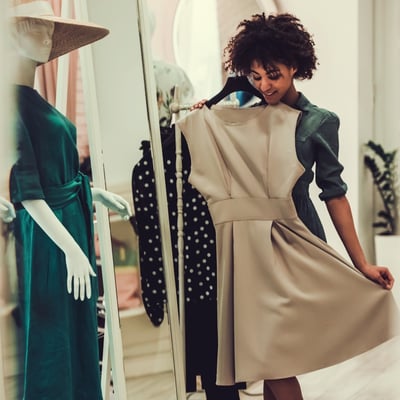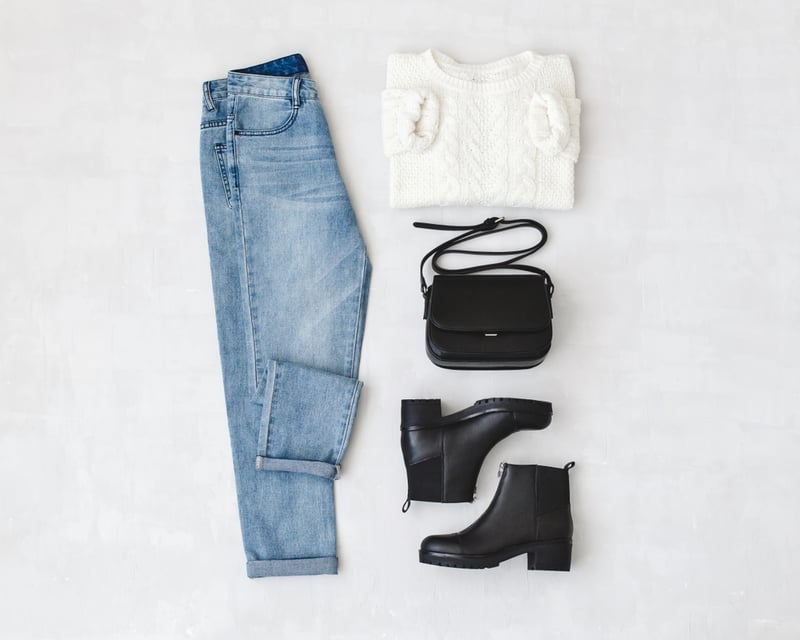Whether you’re going shopping for new clothes or you just want to talk about what you’re wearing, it’s helpful to know some vocabulary for basic clothing items in Portuguese.
Get Dressed!
First, let’s cover which verbs we can use to talk about getting dressed.
usarto wear, to use
vestirto dress, wear, put on
vestir-seto dress oneself
calçarto put on (footwear)
calçar-seto put on one's shoes
pôrto put (on)
Usar can be confusing because it also means to use, but as always, context matters! When you see it in the context of clothing, it means to wear.
No verão eu uso calçõesIn the summer I wear shorts
Vestir also means to wear or put on a piece of clothing. You will often see it as a reflexive verb (that’s what the -se in vestir-se represents) because usually the intended meaning is I dress myself, They dress themselves, etc. We won’t worry too much about reflexive verbs until later units, but it’s good to have a heads up!
Eu visto as tuas roupasI wear your(sing.,inf.) clothes
Eu visto-me elegantementeI dress elegantly
Calçar is only used for footwear and gloves, despite the fact that it sounds very similar to as calçaspants, trousers . Just like vestir, this often appears as a reflexive verb.
Tu calças as sandáliasYou(sing.,inf.) put on the sandals
A menina calça a luvaThe girl puts on the glove
Pôr is pretty straightforward. It means to put (something) on.
Ele põe o chapéuHe puts (on) the hat
Shopping Trip
 If you’re at a clothing store and want to try something on, you could say:
If you’re at a clothing store and want to try something on, you could say:
Posso experimentar?Can I try (it on) ?
Or if you’re just browsing:
Estou só a ver, obrigadoI’m just looking, thanks. (male speaker)
Estou só a ver, obrigadaI'm just looking, thanks. (female speaker)
Let’s move on to an overview of some useful Portuguese clothing vocabulary! Don’t forget, members have to the option to add these words to their Smart Review to practice later. Plus, the following lessons will let you practice in sentences. 😉
Clothing, In General
a roupaclothing
as roupasclothes
vestuárioclothing, apparel
Head & Neck
o chapéuhat
o bonéhat
o gorroknit cap, beanie
os óculosglasses
o cachecolscarf
a gravatatie
o colarnecklace
o lenço de pescoçoneckerchief
Upper Body
a camisashirt
a camisolasweater
o sutiãbra
o vestidodress
o casacocoat
as luvasgloves
o relógiowatch, clock
a t-shirtt-shirt
a blusablouse
o blusãojacket
o fatosuit
o blazerblazer
Lower Body
as calçaspants, trousers
calças de gangajeans
o cintobelt
os calçõesshorts
a saiaskirt
as cuecasunderpants, boxers
os bolsospockets
a mini saiamini-skirt
os boxersboxers
Feet
os sapatosshoes
as meiassocks
as botasboots
as sandáliassandals
as sapatilhassneakers
os ténistrainers, sneakers, running shoes
Note: The singular form of os ténis is o ténis.
Other Accessories
a carteirawallet
a pulseirabracelet
o relógiowatch, clock
a malabag
o sacobag
A mala is the term generally used for purses, handbags, and luggage. O saco can refer to a beach bag, tote bag, trash bag, plastic bag, etc. To specify, you can add information with something like a mala de mãohand luggage , when you’re traveling, or o saco de plásticoplastic bag , when you’re at the supermarket.






In another unit you’ve used colocar in relation to hats (tu colocas o chapéu). Should this be added here – just to add to the verb choice merriment?
The verb “colocar” is really not that common, specially when referring to clothing. It’s more of a formal verb, used to make sentences sound more polite. “Colocar” means “to place”. For example: “I’m going to place this is in here” / “Vou colocar isto aqui”. Usually you’d just say: “I’m going to put this in here” / “Vou pôr isto aqui”. So, I would say that “colocar” has no place in that verbs list.
🙂
Is there really only one word for both nouns? Do Portuguese ever use something like um relógio de pulso to differentiate? Obrigado!
Yes, it’s only RELÓGIO for any kind of device that tells the time! However, according to context, you should know what kind of relógio it’s meant. If not, you can specify “relógio de pulso” (wristwatch), “relógio de bolso” (pocket watch”), “relógio de parede” (wall clock), “relógio de cuco” (cuckoo clock), “relógio despertador” (alarm clock), “relógio de pêndulo” (pendulum clock), etc.
This is extremely helpful, obrigada!
Desculpe, this was probably covered but I can’t find it. Tu tens sapatos e meias. Why not tu tens os sapatos…? Would it be wrong? Obrigado. Lester
Olá! It wouldn’t be wrong at all, it just depends on whether the sentence is more general/neutral or more specific:
– Tu tens sapatos e meias = You have shoes and socks (general/neutral statement)
– Tu tens os sapatos e as meias = You have THE shoes and THE socks (more specific statement, as if you wanted to clearly distinguish these shoes and socks from any other possible shoes and socks, or be more emphatic)
Obrigado Joseph
Hi guys. How do you make a difference between suitcase and purse ? Are they both “mala” ? Thanks !
Hi! They are both “mala” and from context you may guess which one someone is referring to. However, purse can also be called “carteira”. “Carteira” may also be a wallet. If you say “carteira de senhora” or “mala de senhora” you won’t be mistaken: it’s a purse. 🙂
Hi there
For the fetishists amongst you, here is what I was being shown in a supermarket, together with the pictures: meias, souquetes, mini meias, pezinhos, protege pés. In descending order 😁 — I didn’t know buying socks could be that burdensome… 😅